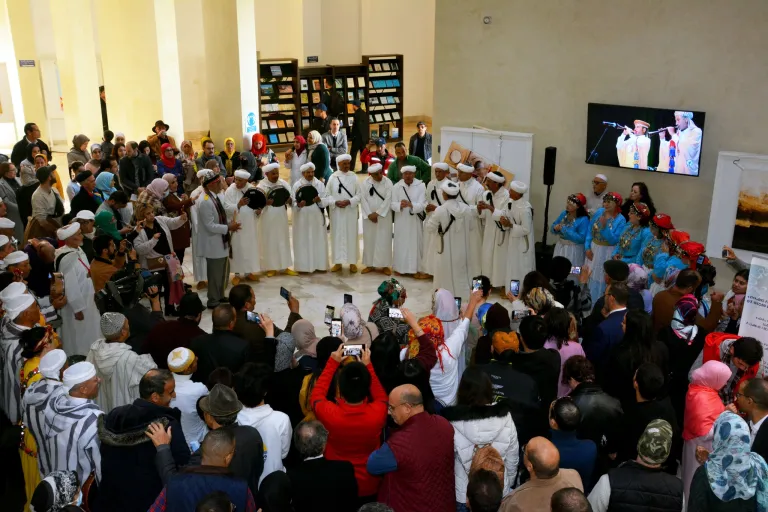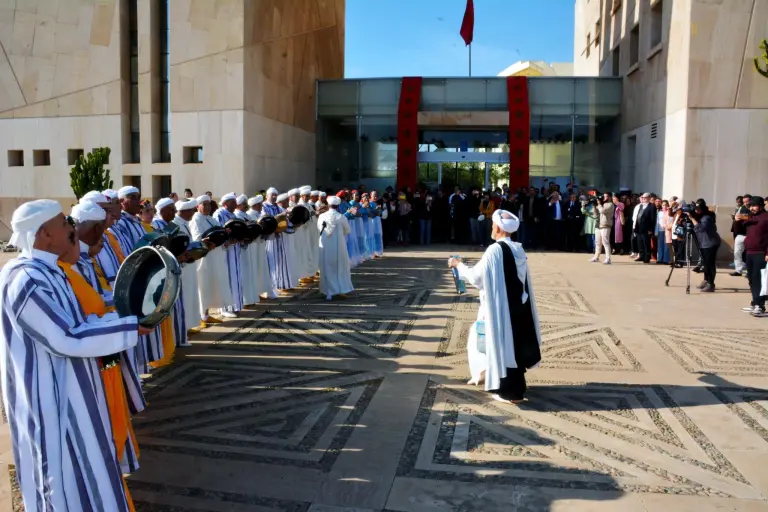Abdel Salam Khalfi: Celebrating the Amazigh year is a celebration of the historical extension of the Amazigh identity in Moroccan history

Today, Friday in Rabat, the Royal Institute of Amazigh Culture celebrated the Amazigh New Year 2973, which falls on January 13 of each year, under the slogan “Preserving Water Preserving Life.”
On this occasion, the researcher at the Royal Institute of Amazigh Culture, Kamal Aqa, explained that the institute has always celebrated the Amazigh year by organizing scientific and communication meetings aimed at introducing the Amazigh culture, as well as the most important meals and activities carried out by the Amazigh person.

Aqa said, in a statement, that this celebration is a tradition rooted in Moroccan culture as well as in North Africa, highlighting that the Institute's commemoration of the Amazigh year, like many governmental and non-governmental institutions, gave impetus to this memory.
He expressed the hope that this dynamic will continue to celebrate the Amazigh year, and that the Amazigh New Year will become an official holiday celebrated by all Moroccans.

For his part, the researcher at the Royal Institute of Amazigh Culture, Abd al-Salam Khalfi, said regarding the dynamism of the celebration of the Amazigh year this year, “The Amazigh year, or the Amazigh year, has been growing continuously in recent years, and has become a popular celebration celebrated by all segments of Moroccan society. Which has been inherited through generations, and it is a celebration that has a close relationship with the land and women and with the Amazigh history of the North African region.”
Khalfi added in a statement to the “Amazigh World” that the growth and awareness of the Amazigh year, which we are witnessing today, has taken a new, modernist vision for this celebration, and this is what made the Amazighs, whether in Morocco or Algeria or in Tunisia and Libya and in the countries south of the Sahara in which the Amazighs are present and in the diaspora The world is engaged in celebrating this occasion.

Khalfi explained that the celebration of the Amazigh year is very large, as it is a popular celebration of awareness of identity and the historical extension of this identity in Moroccan history, which is still being deepened.
He stressed that "the official recognition of this feast and this celebration and a paid official holiday for all Moroccans has become necessary, which will give an opportunity to extend this feast more and more, especially as it spreads joy, happiness, pleasure and love among all segments of Moroccan society."

Regarding choosing the slogan of preserving water to celebrate the Amazigh year, Khalfi affirmed that this “choice is not arbitrary, but it is a choice that stems first from the context we are going through, which is that water has become a substance that dwindles and is less than a year, and this poses great challenges, to the Moroccans who must be aware With this challenge, and how to deal with water, as an invaluable wealth and with it civilizations are built, because without water there is nothing, and secondly, the context is also related to this celebration, because the celebration of the metabolism of lights is not only a ritual celebration that passes like this, but it is a celebration related to the land And water, and this is evident in some rituals in North Africa, where between 12 and 14 is chosen as the period in which the rain falls and the earth opens up to the sky, and therefore the earth’s womb opens up to give the plant and all its money related to this land, and therefore this sharing of water is a sharing of what the land gives and consumption of what it produces as a blessing A person must eat from it, and in some regions, whether in Morocco or in MoroccoAlgeria and even in Libya, whoever does not eat well from what the earth produces at this time of the year will remain hungry throughout the year.

On the reality of Amazigh today, Khalfi said, “First of all, I favor the work that the government is doing, and I cannot be nihilistic in this regard. It has made efforts in the field of including Tamazight in administrations and everything related to services in public administrations.”
He added, "The Amazigh language cannot advance if we do not have qualified human resources, and here I am talking about training that can only be achieved through education, starting from the elementary level to higher education, to regional centers and to training centers in general."
Khalfi stressed that "the Amazigh language cannot assume the position it deserves unless we have the two components in the Amazigh language," adding, "Today we need a thousand teachers to teach the Amazigh language in public primary schools with the aim of spreading it."

He explained that "the Moroccan state has not yet taken the decisive and necessary step in order to popularize Amazigh at the administrative level, just as there is an absence of Amazigh at the preparatory and secondary qualification levels due to the specialization recorded in teachers, and the same qualification we record at the university level."
Khalfi wondered about how the Amazigh could be serious in the administrations, the university, the media and in all state institutions, when we have not yet had qualified frameworks for that?
He stressed that it is necessary as a first step, in his view, “to provide qualified human resources, for example the government today is working to employ a group of employees in receptions and as social assistants, and this is certainly an important step, but we also need senior executives and university professors in Amazigh, and also For two components in training centers, and we also need teachers in primary, preparatory and secondary, and this matter requires drawing up a plan at the near, medium and long-term levels, so that we will be able after 20 years of generalizing Amazigh at the primary to higher levels, but so far this step has not been completed, and I think that 400 professors per year, and sometimes less than that, the Amazigh language cannot move forward, and if we remain at this pace, the path of the Amazigh language is clear.

It is noteworthy that the festive program for this year included the display of pictures and publications of the institute on the theme of water, as well as a display of plastic paintings, in addition to an artistic segment performed by each of the Tingret Association for the art of Ahidous-Tghassalin, and the Ahawash Youth Association of Imentanot for Amazigh Culture and Heritage Revival.
Rashida Emrezik
Source : websites

